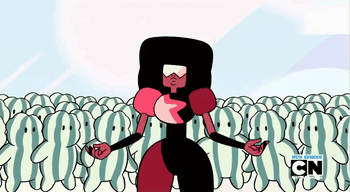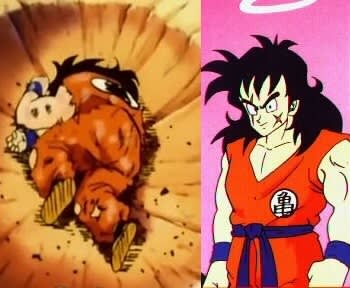5 Times Censorship Made Kids' Shows Hilarious

About 99% of cartoon censorship consists of replacing "damn" for "darn" and making characters yell out "I'm OK!" after they've just been shot in the face. But occasionally, the censorship is so absurd that it actually increases the show's entertainment value. So let's thank those stuffy TV censors for unintentionally hilarious moments like ...
Steven Universe Censored Violence Against Watermelons
Despite being hailed as a supposedly "progressive" show, Steven Universe features a sickening amount of violence ... against watermelons. In one episode, Steven creates some watermelon beings that get slightly overprotective of him (i.e., they start attacking people), so Steven's so-called friends viciously slaughter a bunch of them.

Luckily, various countries saw it fit to protect children from all that fruity gore. Here's the scene from above as it aired in Latin America:

Other regions, like Oceania and Southeast Asia, removed the watermelon violence altogether, collectively saving parents millions in therapy bills. Several countries also censored the opposite of a fruit dying: yes, a vegetable being born. In the episode entitled "Onion Friend," Steven's onion friend shows him a tape of his birth, as one does. You never see the recording itself, only Steven's reaction, but that was already too gross for Australia, New Zealand, the Philippines, Portugal, Turkey, North Africa, and all of the Middle East (which, except for Israel, has since stopped airing the show).

And of course, many countries don't like the fact that not every single character in this show is 100% straight. The UK censored shots of two female characters dancing together, while Kenya straight up banned the show for "promoting homosexuality" by ... acknowledging it exists. It's like they think millions of kids are gonna say "Wait, you can DO that?!" and go off and be gay. (It's probably more like thousands, relax.)
Dragon Ball Z Replaced "Hell" With "Home For Infinite Losers"
Some characters in Dragon Ball Z spend more time dead than alive, which became a problem when the show first came to America, where cartoon characters are cursed with eternal life (Grandpa Simpson has been yearning for sweet oblivion for over 30 years). So, whenever a character died in DBZ, the dubbers at Funimation simply added a line saying they had "gone to another dimension." You know, a dimension with fluffy clouds where you get a halo on your head.

In one episode, Goku dies and goes to a place inhabited by a big, red guy with horns wearing a shirt that says "HELL," a character that seems specifically designed to mess with censors. Funimation got around this issue by changing "HELL" on the demons' shirts to "HFIL." What the hfil is "HFIL"? "Home For Infinite Losers," of course. Because Goku lost a fight, you see, so now he's a loser.


Another time, they went through the trouble of editing out Goku's halo, which made it look like he had a glowing orb over his head like he's in a video game. That, or it's some leftover dandruff from when he was in blonde Super Saiyan mode.

They also went in and changed the animation whenever Goku's son Gohan was shown crying, because they had some rule against showing children in danger. A genocidal villain could be manhandling the kid, but as long as we didn't see any tears, we were supposed to think he was perfectly safe. Some edits were relatively inconspicuous, while others made it look like Gohan was suffering some sort of stroke.


Like the Spider-Man cartoon from the same era and its preoccupation with harming fictional pigeons, X-Men: The Animated Series had to make a lot of silly changes to get past Fox Kids' censors. Wolverine's claws were mostly decorative and the characters couldn't say words like "kill" or "assassinate" ("destroy" or "take their lives" were preferred). Funeral scenes were frowned upon. After Magneto appears to die, the censors suggested the X-Men be shown "talking informally about over coffee or something" instead of attending a ceremony ... which makes sense, because the X-Men must waste millions in funerals for people who aren't dead (or won't be in a little while) every year.
Incidentally, any vague reference to religion was also a big no-no. The Hellfire Club had to be renamed "Inner Circle Club," which sounds more like a country club that doesn't allow Hispanics than a supervillain organization.

Magneto's followers couldn't be called "Acolytes" or refer to him as their "savior," because of the religious connotations. Oh, and he couldn't be Jewish, apparently? The fact that Magneto is a Holocaust survivor is obviously a huge part of the character, so much so that two of the movies open with him as a kid in a concentration camp. But in the show, we see that Professor X met Magneto "after a war" that ravaged his vague Eastern European country, and they're both adults, so it's clearly not World War II. The bad guys from that war (that is, the people responsible for Magneto's hatred of humanity) look like generic mercenaries, lacking the snazzy fashion sense of the Third Reich.

In another episode, Professor X gets Magneto off his back by making him see visions of himself as a kid in a war-torn landscape, calling out for his parents. So Magneto lived through two ersatz World War II's? Damn, that's unlucky.

Nickelodeon Tries To Bleep "Shut Up," Makes It Sound Dirty
Nickelodeon had a reputation for being edgy in the '90s, what with all their fart jokes and Chihuahua-on-cat violence, but they did draw the line somewhere: characters saying "shut up." According to a writer for the show Angry Beavers, when Nickelodeon president Herb Scannell had a daughter, he decided to ban the words "shut up" from all shows to prevent his offspring from ever uttering such foul language. Consequently, when one of the titular beavers tried to silence the other in an episode, Nickelodeon bleeped the word "shut."
Problem was, " up" made the line sound much dirtier, and they got reports of children thinking the character was cursing. Rather than admitting they themselves ed up and there was no reason to censor the line, they made the voice actor go back and re-record it as "shush up."

Scannell also banned the writers from including any cross-dressing scenes, in order to avoid "sexually confusing children" -- as if drag and sexual confusion weren't the building blocks of animated comedy. Furthermore, the final episode of Angry Beavers was supposed to be about the characters becoming aware that they're fictional and accepting the fact that they're about to disappear, at which point one says to the other, "I've got one thing I always wanted to say: shut up!" But, while production was underway, Nick suddenly pulled the plug. The voices were already recorded and all:
Did they think the "cartoon beavers coping with their own mortality" part was too heavy for children? Nah, they just didn't like that the episode pointed out their plan to re-run the show forever without having to pay the cast and crew, which is their entire business model. We're pretty sure they cancelled SpongeBob in 2002 and no one has noticed yet.
Despite being made by a Canadian studio, the prehistoric Transformers prequel Beast Wars couldn't use its real name in Canada. The network that aired it, YTV, forbid using the word "war" on titles (presumably, they aired Star Wars as Droids: The Movie). And so, this '90s show about badass robots who turned into dinosaurs was aired under the adorable title of ... Beasties.

Beasties sounds like it's about cuddly animals spouting BFF-like catchphrases, not a talking truck from outer space disguised as a gorilla. That's why it's ironic that Beasties actually had MORE violence than the version of Beast Wars children in the U.S. saw. Anything deemed objectionable by the ridiculous prudes at Fox Kids (from headbutts to killing tarantulas) was replaced by an obvious fade to black. Here's one of the voice actors boasting about Beasties being "way more violent than the U.S. cut":
Immediately followed by a fade to black. Someone from Fox Kids must be working at YouTube.
As a side note, one of YTV's hosts says the network also banned any reference to Pogs because Pogs led to gambling, and gambling inevitably led to "alcohol and sex addiction." Which is insane, because any kid who collected Pogs was too broke to pay for booze or prostitutes.
Iran Makes Their Own (Bonkers)Iran has an intense love-hate relationship with SpongeBob Squarepants. On the one hand, they like dressing up female characters when they wear bikinis. As in, they go frame by frame drawing purple blobs over their bodies, making them look like tragic victims of underwater pollution:

In at least one case, they went with the opposite approach to removing a bikini:


According to the SpongeBob wiki, and we have no reason to question their authority on the subject, they even censored the word "Bikini" in "Bikini Bottom" (the characters just live in someone's ass, apparently). Such is Iran's disgust at this show's depravity that, in 2016, a soccer player caused a huge uproar when he wore "SpongeBob trousers," which were deemed too flamboyant. The Washington Post reported that he'd been banned from playing for the national team for six months, although it's possible that he was reinstated after denouncing the yellow demon.
The show made the news in Iran again after the death of Qassem Solemaini this year (that ... that can't be right), when a cleric said the U.S. had no real heroes to assassinate, only the likes of SpongeBob and Spider-Man. And yet, the Iranian people love SpongeBob so much that the networks recut footage from the episodes into Persian music videos, which fit surprisingly well. Honestly, the bit at 2:35 here kinda slaps:
Some videos tell weird stories, like this one about "SpongeBob enlisting in the army at Patrick's suggestion, and then fighting in a war," or this one about someone taking acid and watching SpongeBob (we're guessing).
But the apex of Iran's sponge-related weirdness is SpongeBob In Tehran (2017), an all-new, all-illegal 43-minute movie, currently available for purchase and streaming in the country. It looks like it was animated on a PlayStation 2.
The plot is about SpongeBob, Patrick, and Squidward being send to Iran to find a guy who has the Krabby Patty formula, but instead of looking for the guy, they spend the whole trip stuck in traffic, going back and forth between the same three restaurants, and trying out Persian food. So far, it looks like the typical Middle Eastern vacation. Then the find the guy with the help of a cat detective, go to a soccer match, and the movie abruptly ends.

That's it. You had a nice run, Nickelodeon, but SpongeBob belongs to Iran now.
Maxwell Yezpitelok lives in Chile and also on Twitter.
Top Image: Nickelodeon